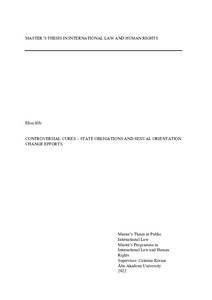Controversial cures - State obligations and sexual orientation change efforts
Jåfs, Elisa (2022)
Julkaisun pysyvä osoite on
https://urn.fi/URN:NBN:fi-fe2022101762303
https://urn.fi/URN:NBN:fi-fe2022101762303
Tiivistelmä
Sexual orientation change efforts (SOCE), more commonly known as “conversion therapy”, is a term used to describe practices with the goal to change a person’s sexuality from nonheterosexual to heterosexual or gender identity from transgender or gender diverse to cisgender. The methods used within these practices range from simple discussion to methods that are severely harmful to the participant, and the practices have no medical backing to stand on. This thesis discusses these controversial practices as well as what role the state plays as a protector, through examining conventions and legal cases.
The state’s positive obligations are a central topic within this thesis. Positive obligations imply that the state should be taking an active preventative role in protecting individuals from being subjected to human rights violations. Legal cases determining the reach of the state’s positive obligations are discussed in order to create a perspective on whether they would be applicable in cases involving SOCE. It is made clear that positive obligations are primarily applicable in situations where a breach of international human rights law is within the state’s capacity to foresee, rather than cases where the breach was too sudden to predict.
The thesis then moves on to examine some of the human rights violations which are most commonly associated with SOCE. The prohibition of torture as well as other forms of illtreatment is given special emphasis due to the nature of the practices, which in their most severe circumstances will involve methods brutal enough to possibly constitute as torture. The right to health as well as the right to privacy are also given emphasis along with the rights of the child in cases where the individual subjected to SOCE is under the age of 18. Based on the discussion about said violations, it is made clear that the factors that make SOCE legally problematic are multifaceted.
The freedom of religion as well as its limitations are then discussed in correlation with SOCE as well as the obligations of the state. The right to manifest one’s religion is limited by the effect it has on others and this is especially crucial in the context of parent and child, as many cases of SOCE occur as a result of the parent pressuring the child into partaking. The thesis reaches the conclusion that manifestation of religion is limited when it harms the child. As for adults partaking in SOCE consensually, the concept of consensual harm and how international human rights law has interpreted this is also discussed.
SOCE is concluded to be a threat to the health and well-being of LGBTQ+ individuals worldwide. Through a legal lens the multiple potential issues with SOCE are clear and since there is no case law on the topic yet, any conclusions must be drawn based on previous case law on related topics. Taking into account the various human rights violations at play this thesis reaches the conclusion that the state’s positive obligations require that action be taken to ban SOCE practices.
The state’s positive obligations are a central topic within this thesis. Positive obligations imply that the state should be taking an active preventative role in protecting individuals from being subjected to human rights violations. Legal cases determining the reach of the state’s positive obligations are discussed in order to create a perspective on whether they would be applicable in cases involving SOCE. It is made clear that positive obligations are primarily applicable in situations where a breach of international human rights law is within the state’s capacity to foresee, rather than cases where the breach was too sudden to predict.
The thesis then moves on to examine some of the human rights violations which are most commonly associated with SOCE. The prohibition of torture as well as other forms of illtreatment is given special emphasis due to the nature of the practices, which in their most severe circumstances will involve methods brutal enough to possibly constitute as torture. The right to health as well as the right to privacy are also given emphasis along with the rights of the child in cases where the individual subjected to SOCE is under the age of 18. Based on the discussion about said violations, it is made clear that the factors that make SOCE legally problematic are multifaceted.
The freedom of religion as well as its limitations are then discussed in correlation with SOCE as well as the obligations of the state. The right to manifest one’s religion is limited by the effect it has on others and this is especially crucial in the context of parent and child, as many cases of SOCE occur as a result of the parent pressuring the child into partaking. The thesis reaches the conclusion that manifestation of religion is limited when it harms the child. As for adults partaking in SOCE consensually, the concept of consensual harm and how international human rights law has interpreted this is also discussed.
SOCE is concluded to be a threat to the health and well-being of LGBTQ+ individuals worldwide. Through a legal lens the multiple potential issues with SOCE are clear and since there is no case law on the topic yet, any conclusions must be drawn based on previous case law on related topics. Taking into account the various human rights violations at play this thesis reaches the conclusion that the state’s positive obligations require that action be taken to ban SOCE practices.
Kokoelmat
- 513 Oikeustiede [106]
